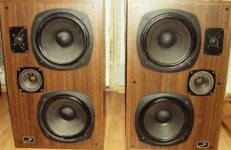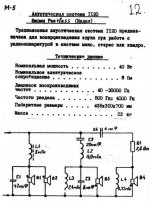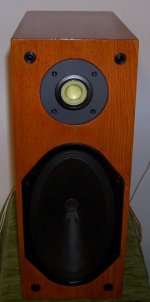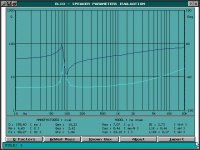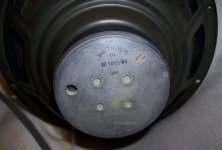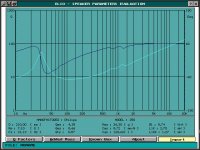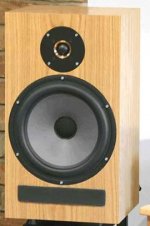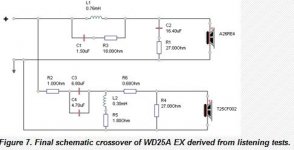I'm looking for crossover circuits vintage Peerless KIT 1060
Radiobransjen nr. 4/1975, side 32
May be somebody made this?
Radiobransjen nr. 4/1975, side 32
May be somebody made this?
No, I haven't made it. And I probably wouldn't! 😀
I was just curious why you are interested in this. I found a design called a KIT 1120, which seems to be the name of the Peerless twin 8-10" paper 1120 woofers involved. All looks a bit familiar. 4" Peerless midrange. Almost a Gale GS401. Tandberg used this mid too.
I don't need to sim that one to know it has a terrible low impedance around 3 ohms. Much better idea here: SEAS-3-Way-Classic
Much the same idea, but better.
I was just curious why you are interested in this. I found a design called a KIT 1120, which seems to be the name of the Peerless twin 8-10" paper 1120 woofers involved. All looks a bit familiar. 4" Peerless midrange. Almost a Gale GS401. Tandberg used this mid too.
I don't need to sim that one to know it has a terrible low impedance around 3 ohms. Much better idea here: SEAS-3-Way-Classic
Much the same idea, but better.
Attachments
Thanks, 1120 I know I'm looking for just a 2 way crossover for kit 1060. I wonder what was the split on tweeter at 1.6 Khz?
KnyazHM, why should anyone care about some ancient Peerless KIT 1060 speaker?
I haven't the faintest idea what it might be. And nor do YOU, apparently. 😀
Why do you care? Why are you here? Tell me more, if you want some help. Crazy Russians. 🙄
I haven't the faintest idea what it might be. And nor do YOU, apparently. 😀
Why do you care? Why are you here? Tell me more, if you want some help. Crazy Russians. 🙄
They just installed a very nice easy tweeter to my ears he's one of the best. The mystery is in the crossover 1600 Hz.
I also found it interesting SEAS A26 kit and Dynaco A25.
Seas A26 sound like Devore Orangutan?
Now I'm listening Audio Note AN-K/LX, Lowther PM6A in BLH and Rehdeko RK35 speakers
I also found it interesting SEAS A26 kit and Dynaco A25.
Seas A26 sound like Devore Orangutan?
Now I'm listening Audio Note AN-K/LX, Lowther PM6A in BLH and Rehdeko RK35 speakers
Last edited:
It's an amusing idea to think a good two-way will compete with a good three-way.
And don't let me stop you trying.
http://www.diyaudio.com/forums/multi-way/305431-good-speaker-scott-299d.html#post5024242
But really, who are you kidding? 😀
And don't let me stop you trying.
http://www.diyaudio.com/forums/multi-way/305431-good-speaker-scott-299d.html#post5024242
But really, who are you kidding? 😀
I do not understand. I just want to try the SEAS A26 or 2-way with Peerlees tweeter, but we need to share in the area of 1600 Hz
Last edited:
I do not understand, why System7 rides on such a hi horse either. Those old things are always a good chance to get another point of view and see, how it was done in the old days. Those paper cone tweeters have qualities unreachable by 1" dome tweeters. Unfortunately also lo power handling, but Peerless used aluminium voice coil formers from very early on, so it is not that bad.
if your woofer can hit 5k reasonably flat, it can easily compete with a three way and be better. A 3 to 5 inch full range with sub can be the best
It's an amusing idea to think a good two-way will compete with a good three-way.
And don't let me stop you trying.
http://www.diyaudio.com/forums/multi-way/305431-good-speaker-scott-299d.html#post5024242
But really, who are you kidding? 😀
I've a good one way, hope your don't hurt yourself laughing 😀
Vintage (Saba) and modern (Focal) speaker set
I was really unsure of the Saba model but otoh I wasn't too much interested in make and model numbers, only in numbers I get from measurements. So it turned out that this midrange unit had an interesting sound quality that I'd describe as natural. After awhile, the second half of the speaker was built and it was a sealed cabinet of Philips AD 1065 W8. Photos of the woofer cabinet is gone. Anyway the idea was to build as much from scrap materials. My newest philosophy and joy in respect to speaker building is to use junk parts (meaning not having to pay serious amounts) to prove that application is almost everything.
Those old things are always a good chance to get another point of view and see, how it was done in the old days.
I was really unsure of the Saba model but otoh I wasn't too much interested in make and model numbers, only in numbers I get from measurements. So it turned out that this midrange unit had an interesting sound quality that I'd describe as natural. After awhile, the second half of the speaker was built and it was a sealed cabinet of Philips AD 1065 W8. Photos of the woofer cabinet is gone. Anyway the idea was to build as much from scrap materials. My newest philosophy and joy in respect to speaker building is to use junk parts (meaning not having to pay serious amounts) to prove that application is almost everything.
Attachments
The 10" bass idea is established technology.
Here JohnDeVore discusses his Orangutan O/96 speaker:
https://parttimeaudiophile.com/2016/11/27/john-devore-talks-larger-drivers-and-experimental-speaker-designs/
I had a look at some of the issues here:
http://www.diyaudio.com/forums/multi-way/305431-good-speaker-scott-299d.html#post5024242
The BBC probably did a better job than most with the LS5/9:
Rogers Loudspeakers › LS5/9
I thought this old LEAK idea was a practical one, though I'd align the tweeters vertically:
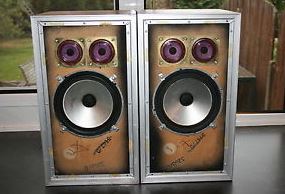
It's always the tweeter that struggles with these low crossovers. You can hear it. And the bass looks better with a notch above 2.5kHz.
Another variation on the SEAS A26 idea was the Peter Comeau design. That bass filter doesn't do much.
Here JohnDeVore discusses his Orangutan O/96 speaker:
https://parttimeaudiophile.com/2016/11/27/john-devore-talks-larger-drivers-and-experimental-speaker-designs/
I had a look at some of the issues here:
http://www.diyaudio.com/forums/multi-way/305431-good-speaker-scott-299d.html#post5024242
The BBC probably did a better job than most with the LS5/9:
Rogers Loudspeakers › LS5/9
I thought this old LEAK idea was a practical one, though I'd align the tweeters vertically:

It's always the tweeter that struggles with these low crossovers. You can hear it. And the bass looks better with a notch above 2.5kHz.
Another variation on the SEAS A26 idea was the Peter Comeau design. That bass filter doesn't do much.
Attachments
Now I'm wondering which speakers to try - Seas A26, Dynaco A25, LEAK, AR3a, Large Advent or KLH
Devore is very expensive
Devore is very expensive
John DeVore's top designs are outrageously expensive. He's using AlNiCo magnets from the exotic range. These babies are £1000 a pop! 😀
For all that, it's just a two way. AFAIK, what makes a good speaker with something intangible called micro-detail, is low mechanical loss and low excursion which makes for low distortion. TBH, that is a bit of a lost art.
We tend to use aluminium voicecoil formers these days, for high power handling. Likewise ferrofluid on tweeters. Even high-loss rubber surrounds. And there is some evidence that spherical dustcaps are a two-edged sword.
I used to own these simple 12" plus 2" Wharfedale Melton II speakers:
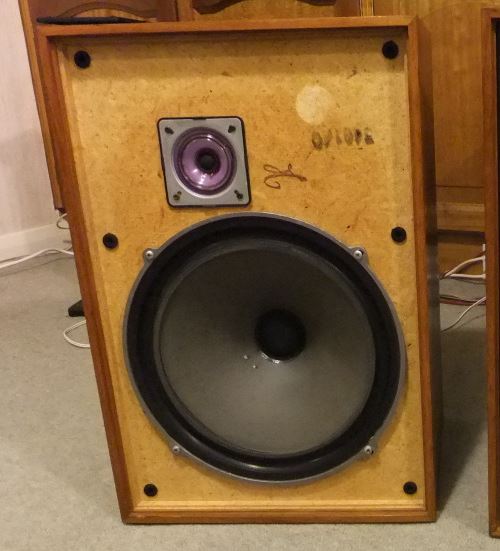
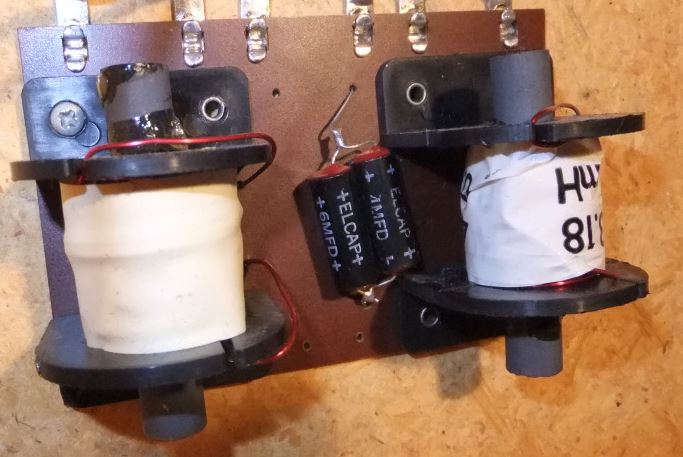
The main reason these things got built was to avoid 25% purchase tax on the "professional" specification. But they had a certain charm. Wide dispersion was not a strength.
Taking all this into account, and living in the modern age, I would fancy these two drivers in a modern 30L vented box:
H1659-08 U22REX/P-SL
H1212-06 27TBFC/G
Not quite perfect, but good value and ticks most of the boxes. The best idea I have seen for what to do with them is this:
Rogers Loudspeakers › LS5/9
Here's how you adapt it:
mh-audio.nl - Home
For all that, it's just a two way. AFAIK, what makes a good speaker with something intangible called micro-detail, is low mechanical loss and low excursion which makes for low distortion. TBH, that is a bit of a lost art.
We tend to use aluminium voicecoil formers these days, for high power handling. Likewise ferrofluid on tweeters. Even high-loss rubber surrounds. And there is some evidence that spherical dustcaps are a two-edged sword.
I used to own these simple 12" plus 2" Wharfedale Melton II speakers:


The main reason these things got built was to avoid 25% purchase tax on the "professional" specification. But they had a certain charm. Wide dispersion was not a strength.
Taking all this into account, and living in the modern age, I would fancy these two drivers in a modern 30L vented box:
H1659-08 U22REX/P-SL
H1212-06 27TBFC/G
Not quite perfect, but good value and ticks most of the boxes. The best idea I have seen for what to do with them is this:
Rogers Loudspeakers › LS5/9
Here's how you adapt it:
mh-audio.nl - Home
- Status
- Not open for further replies.
- Home
- Loudspeakers
- Multi-Way
- Vintage Peerless KIT 1060 crossover circuits
